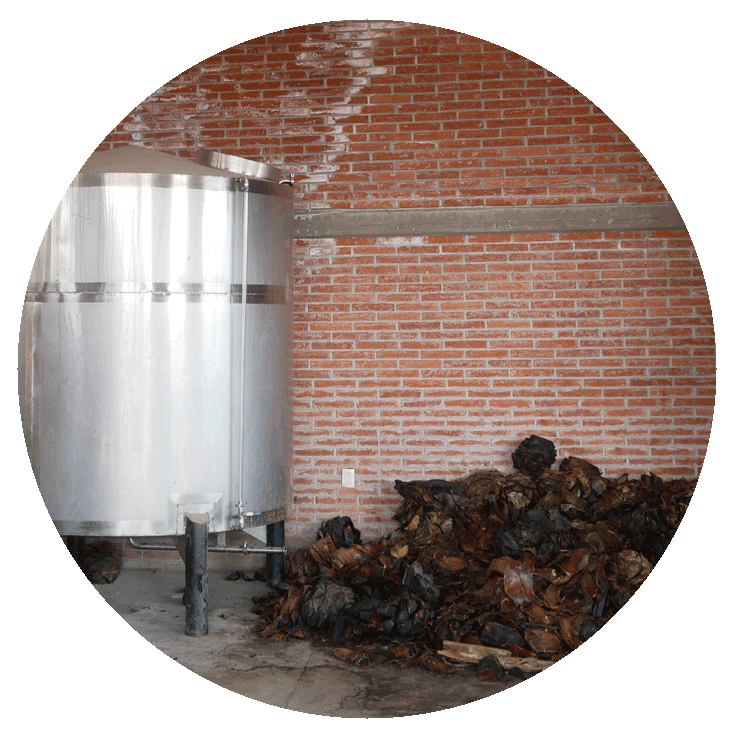
FARMING
After planting the agave is farmed for 8 years or up to 35 years, depending on the type of the agave. The wild agaves take the longest.
The success of the agaves depend upon the geographic zone, the climate conditions and the way they are taken care of. The best agaves are selected to elaborate a 100% natural and handcrafted mezcal, with a unique flavor and bouquet.


HARVESTING
The leaves of the agave known as capón (castrated) are cut. (this action is called jimar) until the heart of the agave is exposed. The hearts are transported to the production factory for the next step of the process.


COOKING
The agaves are poured into an oven and sealed so that the raw elements of the plant and the carbohydrates become sugar.


GRINDING
Once the plant is cooked it is grinded to remove the strings. This juice is called must.


FERMENTATION
After being grinded, the must is placed in tanks for its fermentation; that is, from the grinder it is placed in a wooden tub and left there for fermentation. Here, the sugar is transformed into alcohol thanks to the yeast.


DISTILLATION
After a “double distillation” the alcohol and the water settled in a copper pot still are separated getting the final product called mezcal.

 After planting the agave is farmed for 8 years or up to 35 years, depending on the type of the agave. The wild agaves take the longest.
After planting the agave is farmed for 8 years or up to 35 years, depending on the type of the agave. The wild agaves take the longest.
The success of the agaves depend upon the geographic zone, the climate conditions and the way they are taken care of. The best agaves are selected to elaborate a 100% natural and handcrafted mezcal, with a unique flavor and bouquet.
 The leaves of the agave known as capón (castrated) are cut. (this action is called jimar) until the heart of the agave is exposed. The hearts are transported to the production factory for the next step of the process.
The leaves of the agave known as capón (castrated) are cut. (this action is called jimar) until the heart of the agave is exposed. The hearts are transported to the production factory for the next step of the process.
 The agaves are poured into an oven and sealed so that the raw elements of the plant and the carbohydrates become sugar.
The agaves are poured into an oven and sealed so that the raw elements of the plant and the carbohydrates become sugar.
 Once the plant is cooked it is grinded to remove the strings. This juice is called must.
Once the plant is cooked it is grinded to remove the strings. This juice is called must.
 After being grinded, the must is placed in tanks for its fermentation; that is, from the grinder it is placed in a wooden tub and left there for fermentation. Here, the sugar is transformed into alcohol thanks to the yeast.
After being grinded, the must is placed in tanks for its fermentation; that is, from the grinder it is placed in a wooden tub and left there for fermentation. Here, the sugar is transformed into alcohol thanks to the yeast.
 After a “double distillation” the alcohol and the water settled in a copper pot still are separated getting the final product called mezcal.
After a “double distillation” the alcohol and the water settled in a copper pot still are separated getting the final product called mezcal.


